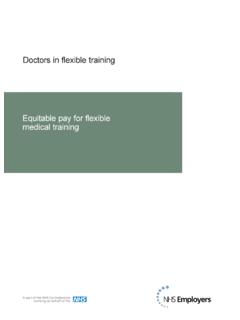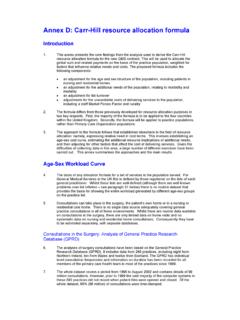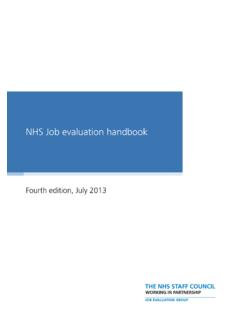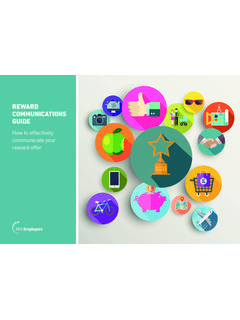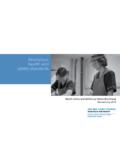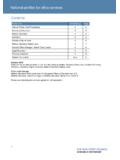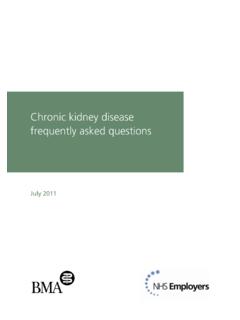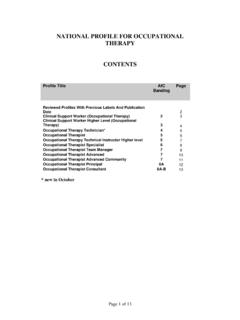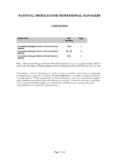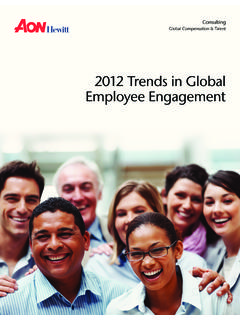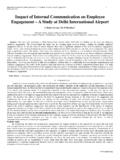Transcription of The relaTionship beTween ToTal reward and …
1 May 2016 The relaTionship beTween ToTal reward and employee engagement ssssssssssss an evidence-based reviewThis report was commissioned by and developed in partnership with nhs employers. it was written by duncan brown, Amanda callen and dilys robinson from ies. 2 May 2016 The relaTionship beTween ToTal reward and employee engagementMAY 2016 The relaTionship beTween ToTal reward and employee engagemenTexecutive summary The context The findings conclusions and implications introduction background report aims methodology and work stages report structure The context: why ToTal reward and employee engagement ? ToTal reward definitions models and components ToTal reward and the psychological contract The breakdown and component parts of ToTal reward The nhs perspective on ToTal reward engagement ToTal reward , engagement and the challenges problems of definition, evidence and controversy The separation beTween research and practice, economics and psychologysection summary The Findings: employee engagement and ToTal reward links beTween ToTal reward , engagement and performance ToTal reward and turnover intention how do the linkages operate?
2 What about the relationships and evidence in the nhs ToTal reward components and evidence for linkages to engagement Fair pay and engagement ToTal reward , flexible benefits and choice communication about reward ToTal reward statements recognition and appreciation practice section summary conclusions and implications conclusions implications for employers implications for research referencesbibliography conTenTs3344666789991011121314191920 22232326283032333637383942434343464748 May 2016 3 The relaTionship beTween ToTal reward and employee engagementexecuTive summaryIn early 2016, NHS Employers commissioned the Institute for Employment Studies to conduct an evidence review in the areas of ToTal reward and employee engagement . The review would look at the nature of any relaTionship beTween the two and whether there is a link to organisational performance.
3 This report contains our findings and it aims: to summarise existing research on the links beTween ToTal reward and employee engagement to draw out the implications of our findings for employing organisations in the NHS in terms of how they can best leverage that introductory comments the report is divided into three sections: the context the findings conclusions and contextIn section two, we review and define the concepts of ToTal reward and employee engagement . Both are broad, all-encompassing concepts with many different definitions, informed by varied disciplines such as: economics sociology psychology. While there is a significant number of practitioner comments and assertion, we highlight a lack of a significant evidence basis in research for either concept, which is particularly marked with respect to ToTal reward , and a lack of evidence regarding the nature of any relaTionship beTween key reason for this is the divide beTween academics and practitioners.
4 We conclude that, in practice, HR practitioners and managers may have a lack of knowledge and guidance in terms of how best to use ToTal reward to deliver the behaviours and feelings from employees that will support high performance (Gerhart and Milkovich, 1992). This can lead them to rely on anecdotal evidence, tried and tested rules of thumb , or even fads and fashions . The separation beTween HR and reward practitioners, who can find it difficult to produce evidence as to the effectiveness of their methods, and academics failing to answer the questions that managers need answering (Davis, 2015), has led to continuing controversy and debate. Bloom and Milkovich (1995, p. 18,19) believe that, given the lack of research evidence for reward management practice, a better blend of theory, research and practice holds the promise of expanding knowledge about the forces and processes that shape reward systems . Despite these questions, the ToTal reward concept, and its links with employee engagement , does hold out the potential to bridge some of these divides.
5 4 May 2016 The relaTionship beTween ToTal reward and employee engagementMAY 2016 The relaTionship beTween ToTal reward and employee engagemenTThe findingsOur review of the literature that is available (mostly grey or practitioner literature using robust methodologies), indicates the complexity of any relationships beTween ToTal reward practices, employee engagement and performance outcomes. They appear to be multi-directional, influenced by a range of other variables, and highly study/situation-specific. We consider the overall nature of any relaTionship , as well as the specific dynamics of it in terms of: fair pay flexible benefits reward communications ToTal reward statements recognition and appreciation and implicationsThe evidence gathered makes clear that there is no ToTal reward silver bullet that will result in employees being automatically engaged and both extrinsically and intrinsically motivated, leading to performance benefits flowing throughout the NHS (Brown and Reilly, 2013).
6 Conclusions drawn from reviewing this evidence High levels of employee engagement can deliver positive organisational benefits. Appropriate reward practices and processes, both financial and non-financial and managed in combination, can help to build and improve employee engagement , and badly designed or executed financial rewards can hinder it. The broader the definition of ToTal reward that is adopted, including a wide range of extrinsic and intrinsic, financial and non-financial rewards , then the more significant the potential impact on employee engagement appears to be. This raises the definitional issue as to how far ToTal reward and employee engagement are overlapping concepts. In a context where employees feel totally rewarded for their contribution, and valued and recognised by managers, then higher levels of employee engagement and higher levels of performance are more likely to occur, particularly in customer service and care settings.
7 reward is also one of the bundle of HR practices that is also associated directly with higher organisational performance. Besides using reward to attract and retain employees, this review would suggest that organisations can design approaches to reward that are likely to promote employee engagement and thereby to support and further improved organisational performance. May 2016 5 The relaTionship beTween ToTal reward and employee engagementareas in need of further research across the nhs and wider More multi-stakeholder and multi-disciplinary studies comparing the views of employees and managers on financial and non-financial rewards , their influence on employee behaviour and the barriers to managers in creating totally rewarding work environments. More in-depth surveys of employee attitudes to their ToTal rewards , supported by focus group discussions to help to understand why they feel as they do.
8 More time-series case studies following the progress of specific ToTal reward strategies and changes in individual employers. More studies which specify and assess the effectiveness of ToTal reward strategies and changes. This is still a relatively under-researched area (Armstrong, Brown and Reilly, 2010, 2011). Research would also be beneficial into the nature and forms of reward communications that employees perceive to be most model1. Begin with a deep examination of the present strategy, organisation and culture, and discover how the leadership want these to be in the organisation. Followed by developing an understanding of what brings people to work, keeps them with the organisation and motivates them to perform while there, allowing an engagement model to be constructed. 2. Having constructed an engagement model, look at the number of different deals that apply in the organisation for different types of employee and what the significant components might be.
9 3. Design and amend reward programmes to leverage the different aspects of engagement for the various staff groupings. ToTal reward in most organisations maybe segmented to take account of key employee differences. 4. When development is complete of new or amended reward arrangements designed to improve employee engagement generally in the organisation or for specific groups, their level of effect and success should be measured. 5. Given that bundles of HR practice are likely to deliver the best results, a holistic, broad approach to ToTal reward and people management is required, integrating HR practices in a purposeful reward - engagement relaTionship is complex, situation-specific and generally involves multiple factors and drivers, financial and non-financial. This complexity highlights the importance of a ToTal reward approach in engaging the diversity of the workforce and meeting the wide variety of employee needs, and explains why NHS Employers has been carrying out work in this area.
10 Based on our research, IES has proposed a five-step model that employers can use for developing a ToTal reward strategy (Reilly and Brown, 2008).6 May 2016 The relaTionship beTween ToTal reward and employee engagementMAY 2016 The relaTionship beTween ToTal reward and employee engagemenT1. inTroducTionbackground Against a backdrop of continuing public sector austerity, increasing workloads and pay restraint, and alongside a more diverse and demanding workforce and re-emerging recruitment and retention issues in professions such as nursing, the concept of ToTal reward has been gaining prominence in recent years (Brown and Reilly, 2013). It has been promoted by HR professionals and consultants as a way for employers to communicate the full range of rewards that their employees gain from employment with the organisation, and to maximise the perceived value of rewards at a given cost level to the employer. UK data suggests that following the post-crash decline in UK living standards, pay and ToTal reward are rising up the engagement and motivational agenda for employees, as satisfaction with pay declines (Aon Hewitt 2014).
